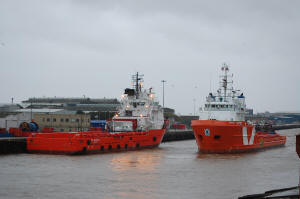| Gorleston, which is still a popular seaside resort, lies one mile south of
Great Yarmouth.
Originally it was part of Suffolk, but then became
annexed to Yarmouth under the 1832 Parliamentary reform
Act. Like Yarmouth it was an important herring port
before the decline in the fishing industry and hundreds
of drifters used to unload their catches at its
wharfs. There is an old saying: 'Gorleston was Gorleston
ere Yarmouth begun/ And will be Gorleston when Yarmouth
is gone.'

River Yare at Gorleston

Henry Sutton
The novelist Henry Sutton named his 1995 novel after
the town. It is the story of Percy Lanchester, a
pensioner, who is struggling to come to terms with the
death of his wife. Percy's life is turned upside down
when he meets a notorious widow named Queenie. Sutton
(1963 - ) grew up at nearby Hopton - so he knew the
location very well. He worked as a journalist for many
years in London before becoming a full-time novelist.
Sutton now teaches on the Creative Writing course at the
University of
East Anglia. Gorleston also provides the setting
for another novel - namely The History of Us by
Philip Leslie which tells the story of a close-knit
group of friends growing up in the town. The book
features many locations including the now demolished
Links Hotel. The book was shortlisted for the 2009 East
Anglian Book Awards.
In 1857
Edward FitzGerald came to Gorleston with his new wife
Lucy Barton in search of a house. While they were here they
received a visit from George Borrow who was living in
Yarmouth at the time. Borrow had lent FitzGerald a copy
of The Romany Rye. FitzGerald's marriage lasted
barely a year and soon after he became friendly with a
Lowestoft fisherman called Joseph 'Posh' Fletcher. The
two men bought a herring lugger named the Meum et
Teum but the venture soon collapsed due to
Fletcher's alcoholism and FitzGerald's lack of business
acumen. FitzGerald is best remembered for his free
translation of
The Rubáiyát of Omar
Khayyám.
Charles Dickens stayed at The Feathers Inn in Gorleston
in 1849. The surrounding countryside and the town of
Great Yarmouth provided the setting for his
semi-autobiographical novel David Copperfield. Gorleston lies at the mouth of the
River Yare - close to
where it enters the North Sea. If you stand at the South
Pier lighthouse you can watch the grey-green waters
merge with the salt water. This place always puts me in mind of
A.C. Swinburne's poem
The Garden of Proserpine which, although not
inspired by the location, nevertheless seems apt:
|

